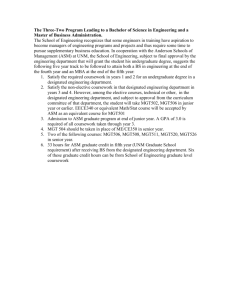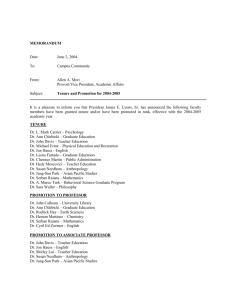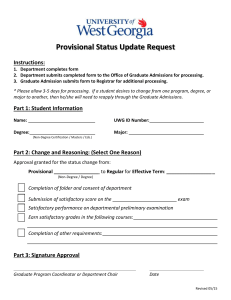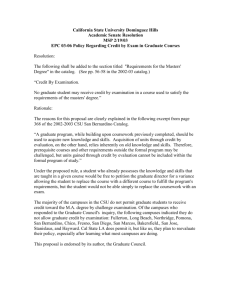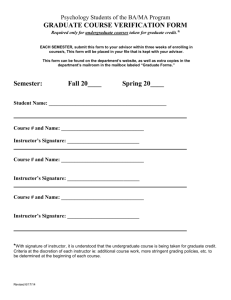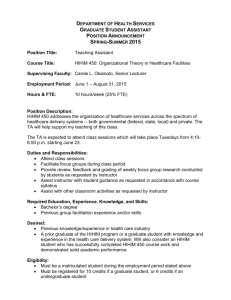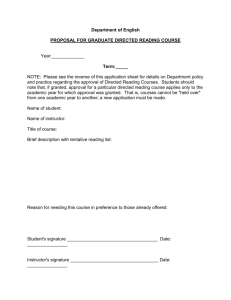MS ES 02 - Marshall University
advertisement
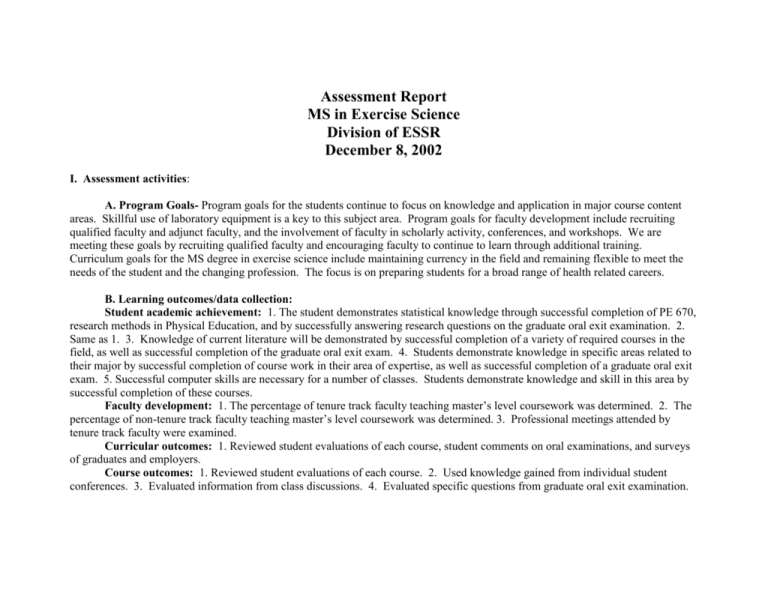
Assessment Report MS in Exercise Science Division of ESSR December 8, 2002 I. Assessment activities: A. Program Goals- Program goals for the students continue to focus on knowledge and application in major course content areas. Skillful use of laboratory equipment is a key to this subject area. Program goals for faculty development include recruiting qualified faculty and adjunct faculty, and the involvement of faculty in scholarly activity, conferences, and workshops. We are meeting these goals by recruiting qualified faculty and encouraging faculty to continue to learn through additional training. Curriculum goals for the MS degree in exercise science include maintaining currency in the field and remaining flexible to meet the needs of the student and the changing profession. The focus is on preparing students for a broad range of health related careers. B. Learning outcomes/data collection: Student academic achievement: 1. The student demonstrates statistical knowledge through successful completion of PE 670, research methods in Physical Education, and by successfully answering research questions on the graduate oral exit examination. 2. Same as 1. 3. Knowledge of current literature will be demonstrated by successful completion of a variety of required courses in the field, as well as successful completion of the graduate oral exit exam. 4. Students demonstrate knowledge in specific areas related to their major by successful completion of course work in their area of expertise, as well as successful completion of a graduate oral exit exam. 5. Successful computer skills are necessary for a number of classes. Students demonstrate knowledge and skill in this area by successful completion of these courses. Faculty development: 1. The percentage of tenure track faculty teaching master’s level coursework was determined. 2. The percentage of non-tenure track faculty teaching master’s level coursework was determined. 3. Professional meetings attended by tenure track faculty were examined. Curricular outcomes: 1. Reviewed student evaluations of each course, student comments on oral examinations, and surveys of graduates and employers. Course outcomes: 1. Reviewed student evaluations of each course. 2. Used knowledge gained from individual student conferences. 3. Evaluated information from class discussions. 4. Evaluated specific questions from graduate oral exit examination. C. Results. Student academic achievement. 1. All students taking PE 670 made an acceptable grade in the course. All students except one successfully passed the graduate oral examination. 2. Same as 1. 3. Students demonstrated this competency by successfully completing the required coursework, and all but one was able to successfully pass the graduate oral examination. 4. All students successfully completed required coursework. 5. Students continue to improve their computer skills passing appropriate classes using those skills. Faculty development: 1. Tenure track faculty members are teaching approximately 90% of the major coursework at the master’s level in exercise science. 2. Adjunct faculty members are teaching approximately 10% of the coursework at the master’s level in exercise science. 3. All tenure track faculty attended at least one professional meeting in the past year. Curricular outcomes: 1. A review student evaluations of each course indicates a very positive student opinion of the courses in exercise science. Student comments on oral examinations are positive. Surveys of graduates and employers were not sufficient enough to draw conclusions Course outcomes: 1. A review of student evaluations of each course indicates a positive relationship of outcomes to student expectations. 2. Individual conferences indicate no major problems. 3. Class discussions indicate a positive relationship of outcomes to student expectations. 4. Graduate oral exam responses indicate no major problems. This area of evaluation can be improved by including specific projects that are evaluated. We should evaluate successful completion of projects in major courses. The validity and reliability of these measures is only as good as the person evaluating each outcome. We should consider using outside professors to evaluate the final course projects in certain classes. II. Plans for the coming year: This has been a learning experience for me as a new chair. I do think there are several areas we can improve in. First, I would like to consider outside professors evaluate the major project by students in specific classes. This will encourage both the student and the instructor to perform quality work, and to present the work in a way so the student’s knowledge in that subject area is evident. After the graduate oral exit examination, I would like to develop a brief written survey to ascertain the student’s thoughts regarding the program. The last thing I would like to consider is the most difficult. There should be some way to evaluate the content of the courses to make sure the instructor is up to date and current with the material they are teaching. This could possibly be done by a peer evaluation, possibly from professors outside of our institution. In my opinion, we need to come up with ways to objectively evaluate all objectives that are appropriate for objective evaluation. We need, whenever possible, to use more than one evaluation tool, which will allow some conclusions relative to the validity and reliability of the data. III. Assistance needed: At this time, I am unsure of exactly what type of assistance is needed. I plan to meet with the ESSR Division Coordinators and try and come up with more effective ways of measuring these objectives. IV. What is the one most important thing the program has learned through this process? Evaluation of our programs is very necessary, and if performed correctly, can be very useful. By putting this information on paper, we can see our weaknesses, and hopefully correct them. The evaluation process will help us avoid pitfalls, and will improve the overall quality of the program. This will be a process we should continue to work on and improve. Everything we do, in every major class, is important in this process, and can provide valuable information we need to make the best decisions for our program. Marshall University Assessment of Student Outcomes: ESSR, MS in Exercise Science Component Area/Program/Discipline: Component / Course / Program Level Student Outcome Statistical knowledge Person or Office Responsible Instructor of PE 670, oral exam committee Knowledge in specific areas related to their major Computer skills Instructor, oral exam committee Instructor, oral exam committee Assessment Tool or Approach Student performance in course, oral exam, thesis Student performance on exams, oral exam, presentations, class discussions Presentations, handing in assignments, web assignments, oral exam Standards/ Benchmark Previous performance Results/Analysis Action Taken Satisfactory None Previous performance Satisfactory None Previous performance Satisfactory None
